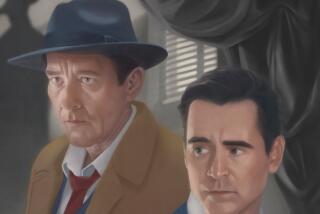MOVIE REVIEW : Plot Twists Litter Harlem Thriller ‘New Jack City’
- Share via
“New Jack City” (citywide) is a modern gangster thriller about the crack cocaine trade in contemporary Manhattan. Much of it is set in a Harlem housing project taken over by the youthful dealers, who turn it into a nightmare fortress and drug factory. This part of the plot seems the wildest and most extravagant of inventions; the fortress itself, honeycombed with dark passages, armed lookouts, TV monitors and writhing addicts, almost like something out of “The Twilight Zone.”
But, in fact, it’s grounded in reality. The actual New York drug fortresses are a potentially wonderful setting for a contemporary thriller. Some other thriller, however. Not “New Jack City,” which gets bogged down in so many archetypal plot maneuvers and degenerates into such narrative chaos that it wastes the talent of a promising young director (actor Mario Van Peebles), an ingenious cinematographer (Francis Kenny, of “Heathers”) and a terrific leading man (Wesley Snipes).
Snipes plays Nino Brown, a would-be Harlem godfather, whose fortunes rise after his main man, Gee Money (Allen Payne), discovers the potential of crack in 1986. Within three years, Brown and his boys, including the requisite number of stammering strong men, menacing slicksters and cold-eyed hookers have taken over the Carter Housing project, flooded Harlem with crack, earned several small fortunes, gone on orgies of debauchery and fake philanthropy and knocked off a good hunk of the Italian Mafia.
They seem invulnerable--though the writers would have us believe that two gonzo cops (rapper Ice-T and Judd Nelson), who initially hate each other, can break down the whole operation, in league with a recovered, once homeless freebase addict (Chris Rock).
The script, updated to accommodate the crack epidemic, apparently began as an examination of 1970s Harlem drug king Nicky Barnes. If it was ever any good, it isn’t any more. We get sexual excess, betrayed friends, humiliated cohorts, gangland confabs and massacres, goombah Mafiosi and individualistic cops who get suspended--all coming at us in exploding bits, as if the story had been composed in a Mixmaster. By the end, the scenarists aren’t even lifting from cop movies and “The Godfather” any more. Embarrassingly, they seem to be borrowing from “Batman.”
But, bad as the overall design remains, individual scenes keep sparking alive, partly because the dialogue, or delivery, seems fresh, and improvisatory; partly because Van Peebles, in his directorial debut, figures out unusual or athletic camera designs for every scene. It’s obvious he has talent, equally obvious there’s no way this story can work right, no matter how strenuous the staging.
Nino Brown, with his gold chains, impromptu slaughter and obsessive viewing of a 16 mm print of the Brian De Palma “Scarface,” is a walking cliche trap. But Snipes is an actor of tremendous resource and presence. Like Van Peebles, he keeps sparking his scenes. And, in his climactic tear-stained betrayal scene, Snipes is stunning: so good, in fact, that he tends to unbalance the movie. Since the heroes, Ice-T and Nelson, are relatively surly and opaque, he gets audience sympathy by default. So does Chris Rock, very fine in the showy part of the one-time freebase addict. But, as for “New Jack City” (MPAA rated R, for sex, nudity, language and violence), sympathy is something it squandered, tears and fear something it tries to earn too cheaply.
‘New Jack City’
Wesley Snipes: Nino Brown
Ice-T: Scotty Appleton
Gee Money: Allen Payne
Pookie: Chris Rock
A Warner Brothers presentation of a Jackson/McHenry production. Director Mario van Peebles. Producers Doug McHenry, George Jackson. Screenplay Thomas Lee Wright, Barry Michael Cooper. Cinematographer Francis Kenny. Editor Steven Kemper. Costumes Bernard Johnson. Music Michel Colombier. Production design Charles C. Bennett. Art directors Barbara Matis, Laura Brock. Running time: 1 hour, 45 minutes.
MPAA-rated R (sex, nudity, language, violence).
More to Read
Only good movies
Get the Indie Focus newsletter, Mark Olsen's weekly guide to the world of cinema.
You may occasionally receive promotional content from the Los Angeles Times.









